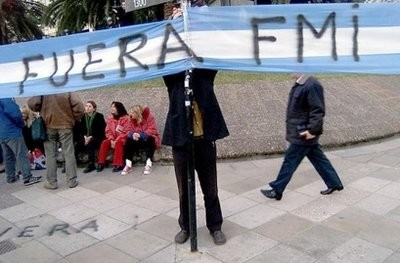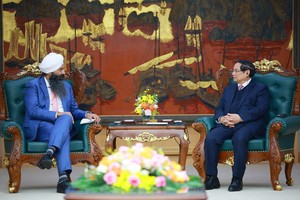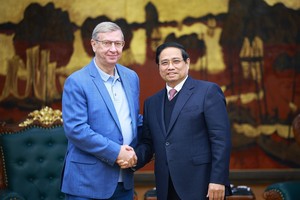The world's largest emerging economies on Tuesday slammed Europe's push to lock up the International Monetary Fund's top job, calling its hold on the position "obsolete."
One day after nominations opened to replace Dominique Strauss-Kahn as managing director, IMF directors from Brazil, Russia, India, China and South Africa -- the so-called BRICS economies -- said Europe's longstanding exclusive deal to lead the IMF "undermines the legitimacy of the Fund."
They strongly objected to the aggressive push by Europeans since last week to have one of their own to replace Strauss-Kahn, who resigned Wednesday after being arrested in New York on sexual assault allegations, which he denies.
"We are concerned with public statements made recently by high-level European officials to the effect that the position of managing director should continue to be occupied by a European," they said.
The 2008-2009 financial crisis in the United States and Europe showed the need to reform institutions like the IMF "to reflect the growing role of developing countries in the world economy," they said.
"This requires abandoning the obsolete unwritten convention that requires that the head of the IMF be necessarily from Europe."
Last week the IMF said it want to make a choice by the end of June, based on consensus among the 24 executive board directors, or possibly by a vote.
No formal nominations have been revealed but Mexico's government said it would propose Agustin Carstens, the respected Mexican central bank governor who has extensive experience at the IMF.
However, within days of Strauss-Kahn's May 14 arrest, European officials were already promoting French Finance Minister Christine Lagarde for the job.
In recent days she garnered strong endorsements from the German, British and Dutch finance ministers as well as New Zealand Prime Minister John Key.
Moreover, earlier Tuesday the chief French government spokesman Francois Baroin said even China was ready to back her.
"The Chinese are favorable to the candidacy of Christine Lagarde," Baroin, who is also France's budget minister, told Europe 1 radio.
"What is being drawn up is a European consensus," Baroin said, adding that France did not want "to make any gesture that could be interpreted as a form of contempt for emerging countries nor any sign of arrogance."
Many European leaders believe the deep problems of the European Union, with Greece, Portugal and Ireland in financial crisis, require an IMF chief current on the region's issues.
Developing country officials accuse the Europeans of trying to ramrod Lagarde through and scare off possible challengers.
For years developing countries have complained about the "gentlemen's agreement" dating to the founding of the IMF at the end of World War II that keeps a European running the Fund while an American leads its sister institution, the World Bank.
The five BRICS directors said that for credibility and legitimacy, the managing director should be selected "after broad consultation with the membership" and decided based on "the most competent person... regardless of his or her nationality."
They recalled then-Eurogroup president Jean-Claude Juncker pledging, at the time of French politician Strauss-Kahn's selection in 2007, that "the next managing director will certainly not be a European."

But they did not name any possible candidates, and so far, developing countries have not coalesced around any one person.
"It's a sign of the times that five directors are issuing a statement like this," said Daniel Bradlow, a law profesor and expert in international financial institutions at American University in Washington.
"They're not endorsing anyone, nor are they agreeing on a single candidate, which is unfortunate, but they have strong words against Europe.
Carstens, the most prominent developing country candidate with his hat in the ring, told Bloomberg television that he would only have a chance for the job if the process is transparent, allowing the IMF's 187 members "to compare resumes, compare experiences, hear the candidates and make up their minds."
"If the process is done in that way, I have a chance," he said.
On Wednesday attention will turn to Lagarde, expected to give a press conference ahead of the Thursday-Friday summit of the G-8 countries in Deauville, France.
On Friday an EU insider told AFP that her name would be advanced during the G-8 meeting, calling her a "shoo-in" as Europe's candidate.
























